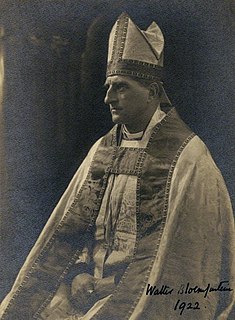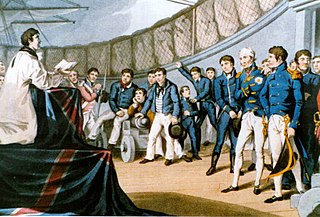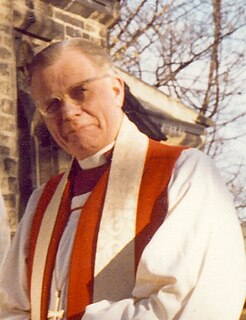 W
WDom Bede Camm, O.S.B., was an English Benedictine monk and martyrologist. He is best known for his many works on the English Catholic martyrs, which helped to keep their memories alive in the newly reemerging Catholic Church of Victorian England.
 W
WThe Rt Revd Walter Julius Carey was an English Anglican clergyman and author who served as Bishop of Bloemfontein in South Africa from 1921 to 1935. Carey was a rugby union forward who played club rugby for Oxford University and Blackheath and played international rugby for the British Isles XV in their 1896 tour of South Africa.
 W
WJohn Chapman was an English Roman Catholic priest, received into the Roman Catholic Church at the age of 25, the 4th Abbot of Downside Abbey of the English Benedictine Congregation from 1929 until his death, and a New Testament and patristics scholar.
 W
WChristopher Maude Chavasse, was a British athlete, soldier and religious leader from the Chavasse family. He competed at the 1908 Summer Olympics in London, served in the First World War and was later the Bishop of Rochester.
 W
WStephen George Comyn was an English naval chaplain who served with Lord Nelson at the Battle of the Nile and Battle of Copenhagen. He was a close friend of Nelson and is said to have been his favourite chaplain.
 W
WHarold Francis Davidson, generally known as the Rector of Stiffkey, was a Church of England priest who in 1932, after a public scandal, was convicted of immorality by a church court and defrocked. Davidson strongly protested his innocence and to raise funds for his reinstatement campaign he exhibited himself in a barrel on the Blackpool seafront. He performed in other sideshows of a similar nature, and died after being attacked by a lion in whose cage he was appearing in a seaside spectacular.
 W
WTheodore Bayley Hardy, was a British Army chaplain and a recipient of the Victoria Cross, the highest award for gallantry in the face of the enemy that can be awarded to British and Commonwealth forces. In addition to the VC, Hardy had been awarded the Distinguished Service Order and Military Cross, making him one of the most decorated non-combatants of the First World War.
 W
WReverend Brian Hession, was an English Anglican priest and military chaplain. He was the vicar of Holy Trinity Walton, Aylesbury from 1937-1949 and served as the military chaplain at RAF Halton from 1935-1937.
 W
WCaptain Eustace Hill was an Anglican Padre of the South African Brigade during the First World War. He won the Military Cross for bravery at the Butte de Warlencourt where he lost his right hand. He was back at Longueval and Delville Wood in 1919 identifying and burying the dead of his Brigade. After the war he returned to St. John's College and became their headmaster from 1922 to 1930. He was responsible for the extension of the school's buildings and for the chapel which was dedicated as a war memorial, and contains one of the five crosses made from the remains of the trees at the battle of Delville Wood. Eustace Hill did not approve of contraception and converted to Catholicism in 1938. He became a monk in 1939, taking the name Brother James. He entered a monastery in Hampshire and remained there until his death on 12 February 1953.
 W
WRupert Edward Inglis was an England international rugby player who later became a Church of England rector. During the First World War, Inglis was a chaplain to the British Army and was killed during the Battle of the Somme.
 W
WRobert Keable was a British novelist, formerly a missionary and priest in the Church of England. He resigned his ministry following his experiences in the First World War and caused a scandal with his 1921 novel Simon Called Peter, the tale of a priest's wartime affair with a young nurse. The book sold 600,000 copies in the 1920s alone, was referenced in The Great Gatsby, and was cited in a double murder investigation. Fêted in the United States, but critically less than well-received, Keable moved to Tahiti where he continued to write, producing both novels and theological works, until his death at age 40 of kidney disease.
Henry Killigrew was an English clergyman and playwright. He became a chaplain to Charles I, and chaplain and almoner to James, Duke of York. Following the Restoration, he became Master of the Savoy.
 W
WCharles Leach was a Congregationalist Minister and Liberal Party politician in the United Kingdom. He is notable as the only Member of Parliament to be deprived of his seat after being declared of unsound mind.
 W
WEdward Noel Mellish was an English recipient of the Victoria Cross, the highest and most prestigious award for gallantry in the face of the enemy that can be awarded to British and Commonwealth forces.
 W
WTitus Oates was an English priest who fabricated the "Popish Plot", a supposed Catholic conspiracy to kill King Charles II.
 W
WJohn David Pawson was an evangelical minister, writer and prominent Bible teacher based in the United Kingdom.
 W
WThe Venerable Wilfred Ernest Granville Payton CB, MA was an English clergyman and cricketer who played first-class cricket for Nottinghamshire in 1935, Cambridge University in 1937 and Derbyshire in 1949.
 W
WCharles Earle Raven was an English theologian, Regius Professor of Divinity at Cambridge, and Master of Christ's College, Cambridge. His works have been influential in the history of science publishing on the positive effects that theology has had upon modern science.
 W
WFrank Thewlis was a British Methodist minister beginning in 1941 and an international conference speaker in the 1950s–1980s. He was born in Huddersfield, Yorkshire. As superintendent of the Brighton Dome Mission Circuit in Brighton between 1967 and 1975, Thewlis preached weekly at the large Brighton Dome Concert Hall in East Sussex, the largest Methodist congregation at the time in the United Kingdom. He was also a frequent guest on "Pause for thought", a religious segment heard on the long-running BBC Radio 2 programme, The Radio 2 Breakfast Show. During a career in the ministry spanning five decades, he preached at the three largest Methodist congregations in the United Kingdom.
 W
WEric Treacy, was an English railway photographer and Anglican bishop.
 W
WSamuel Wesley was a clergyman of the Church of England, as well as a poet and a writer of controversial prose. He was also the father of John Wesley and Charles Wesley, founders of Methodism.
 W
WArthur Foley Winnington-Ingram was Bishop of London from 1901 to 1939.